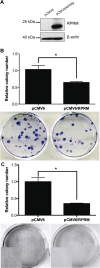Loss of Expression of Reprimo, a p53-induced Cell Cycle Arrest Gene, Correlates with Invasive Stage of Tumor Progression and p73 Expression in Gastric Cancer
- PMID: 25954972
- PMCID: PMC4425545
- DOI: 10.1371/journal.pone.0125834
Loss of Expression of Reprimo, a p53-induced Cell Cycle Arrest Gene, Correlates with Invasive Stage of Tumor Progression and p73 Expression in Gastric Cancer
Abstract
Reprimo (RPRM), a downstream effector of p53-induced cell cycle arrest at G2/M, has been proposed as a putative tumor suppressor gene (TSG) and as a potential biomarker for non-invasive detection of gastric cancer (GC). The aim of this study was to evaluate the epigenetic silencing of RPRM gene by promoter methylation and its tumor suppressor function in GC cell lines. Furthermore, clinical significance of RPRM protein product and its association with p53/p73 tumor suppressor protein family was explored. Epigenetic silencing of RPRM gene by promoter methylation was evaluated in four GC cell lines. Protein expression of RPRM was evaluated in 20 tumor and non-tumor matched cases. The clinical significance of RPRM association with p53/p73 tumor suppressor protein family was assessed in 114 GC cases. Tumor suppressor function was examined through functional assays. RPRM gene expression was negatively correlated with promoter methylation (Spearman rank r = -1; p = 0.042). RPRM overexpression inhibited colony formation and anchorage-independent growth. In clinical samples, RPRM gene protein expression was detected in 75% (15/20) of non-tumor adjacent mucosa, but only in 25% (5/20) of gastric tumor tissues (p = 0.001). Clinicopathological correlations of loss of RPRM expression were significantly associated with invasive stage of GC (stage I to II-IV, p = 0.02) and a positive association between RPRM and p73 gene protein product expression was found (p<0.0001 and kappa value = 0.363). In conclusion, epigenetic silencing of RPRM gene by promoter methylation is associated with loss of RPRM expression. Functional assays suggest that RPRM behaves as a TSG. Loss of expression of RPRM gene protein product is associated with the invasive stage of GC. Positive association between RPRM and p73 expression suggest that other members of the p53 gene family may participate in the regulation of RPRM expression.
Conflict of interest statement
Figures



References
-
- Forman D, Bray F, Brewster DH, Gombe-Mbalawa C, Kohler B, Piñeros M, et al. Cancer Incidence in Five Continents, Vol. X IARC. 2013: Available: http://globocan.iarc.fr. - PubMed
Publication types
MeSH terms
Substances
LinkOut - more resources
Full Text Sources
Other Literature Sources
Medical
Research Materials
Miscellaneous

